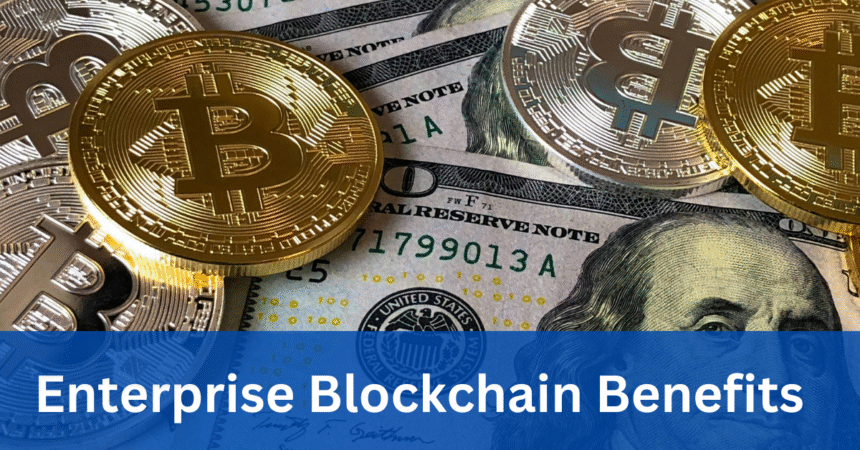In the past decade, blockchain has moved from being the backbone of cryptocurrencies to becoming a serious tool for businesses. Today, large organizations are adopting enterprise blockchain to improve efficiency, transparency, and trust across their operations. Unlike public blockchains, which are open to everyone, enterprise blockchains are permissioned systems designed for business environments. They allow companies to share information securely, streamline workflows, and reduce risks.
But what exactly are the benefits of enterprise blockchain, and why are more companies across industries testing and adopting it? Let’s take a closer look.
What Is Enterprise Blockchain?
Enterprise blockchain refers to a private or permissioned version of blockchain technology used by organizations to manage business processes. Unlike public blockchains like Bitcoin or Ethereum, where anyone can join, enterprise blockchains are controlled by a consortium or a single organization. Participants must be authorized, and data is shared only among trusted parties.
This structure makes it well-suited for industries where privacy, scalability, and regulatory compliance are critical, such as healthcare, finance, logistics, and government services.
Enterprise Blockchain Benefits That Matter
Increased Transparency and Trust
One of the most important enterprise blockchain benefits is transparency. Every transaction is recorded in a tamper-resistant ledger that all participants can see. This reduces disputes and builds trust among parties who may not fully trust each other.
Example: Walmart partnered with IBM to create a blockchain system that tracks the source of food products. What used to take seven days of paper trails can now be traced in seconds, allowing quick identification of contaminated goods and improving food safety.
Enhanced Data Security
Data breaches and fraud cost businesses billions every year. Enterprise blockchains use cryptographic methods to secure records, making them nearly impossible to alter without detection. Since only authorized members can participate, sensitive information is protected while still being shareable among stakeholders.
Stat: According to IBM, blockchain reduces fraud in supply chains by up to 50% in some pilot programs, thanks to secure tracking and authentication of products.
Cost Reduction Through Efficiency
Manual reconciliation of records, middlemen, and paperwork add enormous costs to global industries. By creating a single, shared source of truth, blockchain removes the need for intermediaries and redundant record-keeping.
Example: Maersk and IBM’s TradeLens platform digitized shipping documentation, reducing paperwork and delays in global trade. By automating processes, companies save millions of dollars annually on administrative costs.
Faster Transactions and Settlements
In industries like finance, settlement of transactions often takes days due to verification and clearing processes. Blockchain streamlines this by enabling near real-time settlement.
Stat: Studies show blockchain-based cross-border payments can cut transaction times from 2–3 days to just a few seconds, while reducing fees by up to 60%.
Better Supply Chain Visibility
Supply chains are often complex, involving multiple stakeholders across different countries. Enterprise blockchain gives end-to-end visibility, helping businesses track goods from origin to delivery. This not only improves efficiency but also ensures compliance with regulations.
Example: De Beers, the diamond company, uses blockchain to track diamonds from mines to retailers, ensuring authenticity and preventing the sale of conflict diamonds.
Improved Regulatory Compliance
Compliance is a major headache for industries like finance and healthcare. Blockchain provides an auditable trail of all transactions, which regulators can verify quickly. This reduces compliance costs and helps businesses avoid penalties.
Challenges and Limitations of Enterprise Blockchain
While the benefits are clear, it’s equally important to recognize the challenges. Ignoring these may leave businesses unprepared for real-world adoption.
-
Integration Costs: Implementing blockchain requires significant investment in new systems, infrastructure, and training.
-
Scalability Issues: Some enterprise blockchains struggle with high transaction volumes.
-
Regulatory Uncertainty: Governments are still catching up with blockchain regulations, creating uncertainty in areas like data privacy and cross-border rules.
-
Interoperability Problems: Different blockchain platforms often don’t communicate well with each other, limiting collaboration across industries.
Despite these challenges, many organizations view them as short-term hurdles in the broader path to digital transformation.
Salary Progression in Blockchain Careers
The rise of blockchain has also created career opportunities. Professionals skilled in blockchain development and implementation are in demand, and salaries are attractive.
-
Entry-Level: $70,000 – $90,000 annually
-
Mid-Career: $100,000 – $140,000 annually
-
Senior-Level/Experts: $150,000 – $200,000+ annually
As adoption grows, enterprises will need experts not only in development but also in compliance, cybersecurity, and project management for blockchain initiatives.
How Businesses Can Get Started
If your organization is considering blockchain adoption, here are practical steps:
-
Identify inefficiencies – Look for areas where trust issues, data silos, or delays exist.
-
Run pilot projects – Test blockchain in a limited scope, such as supplier payments or traceability.
-
Choose the right platform – Decide whether a consortium or private blockchain suits your needs.
-
Focus on integration – Plan how blockchain will work with your existing IT infrastructure.
-
Train teams – Equip staff with blockchain knowledge to ensure smooth adoption.
Actionable Takeaway
Enterprise blockchain is not just a buzzword. It is already reshaping industries by improving trust, efficiency, and visibility. While challenges exist, the long-term benefits far outweigh the risks. Businesses that start experimenting today will be better positioned to compete in a data-driven future.
The key is to start small, focus on solving real business problems, and scale adoption as the technology matures.
FAQs About Enterprise Blockchain Benefits
What makes enterprise blockchain different from public blockchain?
Enterprise blockchain is permissioned, meaning only authorized participants can access it. Public blockchains are open to everyone.
Which industries benefit the most from enterprise blockchain?
Finance, supply chain, healthcare, government, and retail are among the top industries adopting it.
Does blockchain completely eliminate fraud?
Not completely, but it greatly reduces fraud risks by creating tamper-proof records and transparent transactions.
Is enterprise blockchain expensive to implement?
Yes, initial costs can be high, but long-term savings from efficiency, compliance, and reduced fraud often outweigh them.
What is the biggest barrier to adoption?
Integration with legacy systems and regulatory uncertainty remain the top barriers.
